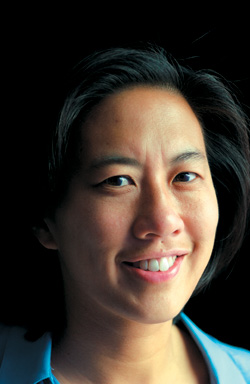 |
|
| Glimpses
Growing up in New York and New Jersey, Ng would spend hours playing pickup. At age 11 she tried organized softball and got hooked. Later at the University, where she met husband Tony Markward, AB’90, the public-policy major joined the women’s fast-pitch team. After graduation Ng went from Chicago White Sox intern to New York Yankees assistant general manager—one of three women ever to hold the position—in less than a decade. With three World Series rings in hand, she headed west. Now the Dodgers’ vice president and assistant general manager, Ng has her eye on the prize: another championship. “I like our prospects a lot,” she said in August. “The guys are raring to go.” By all accounts, so is she. Arc of a career decision: In high school I played tennis and softball. At Chicago I only wanted to play one sport. I wanted to focus on my studies and get my feet wet [academically]. And I was a better softball player. ... My senior year I wondered if there were opportunities in sports, if you could make a career in sports. I didn’t know anyone except coaches. From pinch to designated hitter: My internship with the Chicago White Sox turned into full time, and my responsibilities increased. When I started I was operating the radar gun and inputting scout reports. As I moved up I learned major-league rules, worked with our payroll, analyzed reports we got from the video system that charts games, and started negotiating contracts. I became a larger contributor. On duty with the Dodgers: Today I have a double role. As assistant general manager you oversee player development, professional scouting, trying to get talent into your organization. You’re involved in trades, negotiating contracts with free agents and roster players. You’re in charge of payroll, video operations, medical staff, amateur staff. You basically oversee the operations of baseball. As farm director you’re in charge of a lot of the day-to-day movements within the minor leagues. Highs and lows of the game: I love building something, seeing what has worked, what hasn’t. I love winning. Winning is big to me. I’m a little competitive. ... I like the complexity of the sport. There are certain situations within a game that set up other situations. You have to have an intimate knowledge of the game to appreciate it. One of the hardest things is the turnover in the industry. This past weekend we acquired really good players, but we also traded away really good players. You get emotionally attached. It’s difficult to make these decisions. That’s the way of the business these days. And keeping up with the information flow is also difficult. It’s an endless task. Life in the ballclub: We have professional relationships [with the players]. You go through ups and downs of a season with them. They understand what your job is. You spend so much time on the road, you develop a mutual respect. It’s how you
play: A lot of people face challenges with whatever occupation
they have. I know I am one of the only women in this business. The
dream thing is winning another World Series. If I keep my nose to
the grindstone and I’m successful, hopefully at some point
people will recognize me. |
|
phone: 773/702-2163 | fax: 773/702-8836 | uchicago-magazine@uchicago.edu

 Kimberly
Ng, AB’90
Kimberly
Ng, AB’90